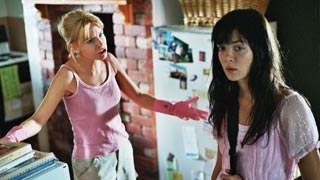

Reviews, credits & stillsGenre: Drama Director: Craig Monahan Lead actor: Emma Lung Cast: Hugo Weaving, Jacqueline McKenzie, Matt le Nevez and Sam Healy Producer: Craig Monahan Screenplay: Sue Smith Music: David Hirscfelder One of the sharpest, coolest Australian films of recent years was The Interview, written and directed by Craig Monahan and featuring powerhouse performances from Hugo Weaving and Tony Martin. It's indicative of the stresses and strains within the Australian film environment that in spite of the international praise heaped on his debut feature, it's taken Monahan seven years to get another film up on the big screen. At that rate, if he's lucky, he might make another three or four features in his career and that's just a ridiculous waste of talent. That said, Monahan's new film is a radical departure from his first. It's a young woman's journey towards selfhood and it's seen largely from a female point of view. The simple reason is that Peaches is written not by Monahan but by Sue Smith, best known for her television series The Leaving of Liverpool and Brides of Christ. What Sue Smith gives us is a story of relationships crippled by ancient history. Jude Callaghan adopted Stephanie as an orphan and she's exaggeratedly protective of her for reasons we will discover. But it hasn't helped the 16-year-old overcome her dyslexia. On her birthday, her grandfather gives her something he's kept hidden — her birth mother's diary. Only problem is, Steph can't read it. Her dyslexia works as a metaphor for her fear of what lies under the surface. Keeping the diary a secret, Steph appeals to Brian Taylor, a young man she knows only slightly, to help her decipher it. There's more stuff under the surface here too, because Brian had been jailed briefly for a violent crime. He's also the half-brother of Alan Taylor, the manager of the fruit canning factory where virtually everyone in Swan Reach works. Steph soon figures out that Jude and Alan were once lovers and that they were intimately involved with her dead parents. As the circles around her questions begin to close, the girl is thrown into a crisis of new and conflicting emotions. Craig Monahan says, "Like any film you make you need to be passionate about it because it takes so long, it'll jump up and bite you if you don't, ah, get right inside it."
Craig Monahan has his hands full with Sue Smith's complex script. As well as its interweaving of multiple relationships, Peaches is set in the present and in the '80s, leading up to Stephanie's violent birth in the car accident that killed her parents. Whatever passion they once felt, Jude and Alan seem now as alienated from life as they are from each other. "I somehow remember the '80s as a relatively buoyant time and everybody who was ever a hero in the newspapers ended up in gaol by the '90s, you know? Ah, so that was kind of interesting, but there was an optimism and there was a buoyancy at that time… I mean, sex is now something that can kill you. I didn't grow up with that idea," Craig says. As Steph begins to understand that her extended family, her mother and father Jass and Johnny, as well as Jude and Alan, were once passionately and happily involved, she begins to question her own clouded existence. Unable to talk to either of her mothers, she initiates a relationship with Alan Taylor which quickly develops into a sexual affair. Peaches is anchored by Hugo Weaving's solid, intelligent performance, matched by Jackie McKenzie's equally sharp, heartfelt Jude. But the greater weight falls on the shoulders of young Emma Lung who, in Monahan's eyes, stands for a new generation… Craig says "Society's changed, you know, and young women are proactive and they do know what they want, a lot of them, or they're sure as hell having a crack at it, and that's good, it's good, and that's part of this central character's journey. Is she making the right decisions, maybe yes, maybe no, but she's, she's not waiting for it to happen, and I see that as a positive thing, a part of what Sue is on about in the first place." PeachesI doubt that the media will be uniformly kind to Peaches. The attack dogs of the right, ever ready to rip into the bleeding carcass of the Australian film industry, will doubtless see in it more evidence of the softness of local filmmaking, more of the squishy, liberal notions that had them spitting poison at Somersault last year. But don't be discouraged. While Peaches arguably has weaknesses, it also breaks fresh ground by exploring sexual intimacy in ways unusual for Australian film. And for those uncluttered by political agendas, that's cause for celebration. Peter Thompson http://sunday.ninemsn.com.au/sunday/film_reviews/article_1799.asp Other linkshttp://www.abc.net.au/atthemovies/txt/s1386327.htm http://www.imdb.com/title/tt0347755/ http://2005.adelaidefilmfestival.org/films/peaches.html
|